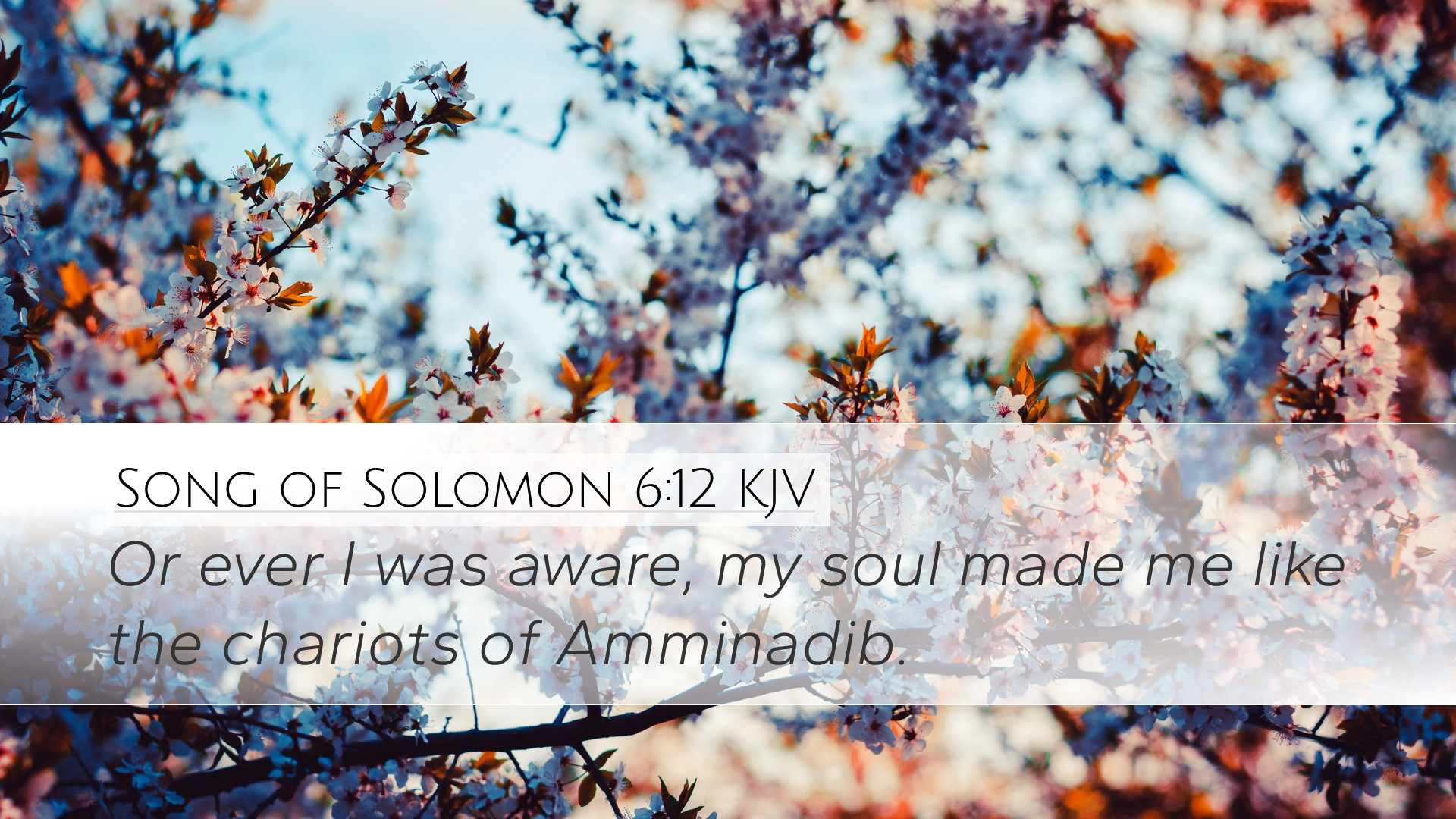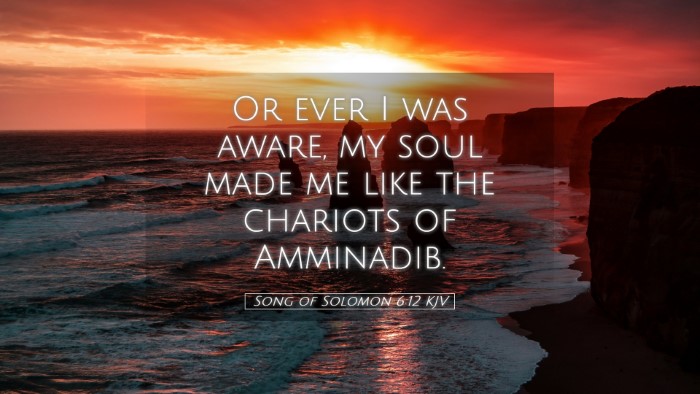Old Testament
Genesis Exodus Leviticus Numbers Deuteronomy Joshua Judges Ruth 1 Samuel 2 Samuel 1 Kings 2 Kings 1 Chronicles 2 Chronicles Ezra Nehemiah Esther Job Psalms Proverbs Ecclesiastes Song of Solomon Isaiah Jeremiah Lamentations Ezekiel Daniel Hosea Joel Amos Obadiah Jonah Micah Nahum Habakkuk Zephaniah Haggai Zechariah MalachiSong of Solomon 6:12
Song of Solomon 6:12 KJV
Or ever I was aware, my soul made me like the chariots of Amminadib.
Song of Solomon 6:12 Bible Commentary
Commentary on Song of Solomon 6:12
Verse: "Before I was aware, my desire set me among the chariots of my noble people." (Song of Solomon 6:12)
Introduction
The Song of Solomon, often regarded as a poetic expression of love, presents a rich tapestry of imagery and metaphor concerning love, desire, and the beauty of romantic relationships. In this particular verse, the verse speaks to the spontaneity of love, the beauty of intimacy, and the transformative nature of romantic affection.
Interpretation & Analysis
Contextual Understanding
In understanding Song of Solomon 6:12, it is pivotal to consider its place within the larger narrative of the poetic book. The previous verses encompass a celebration of love's beauty, while this verse serves as a turning point, revealing the unforeseen consequences of deep emotional investment.
Spontaneity of Desire
Matthew Henry reflects on the phrase "Before I was aware," highlighting the unpredictable nature of love. He notes that desire can sweep individuals off their feet, leading them into experiences or realizations they had not previously contemplated. This spontaneity is intrinsic to love and often leads to deeper connections.
Transition to Higher States
Albert Barnes further elaborates on the idea of being "set among the chariots of my noble people." This phrase signifies being elevated and honored within the realm of love. Chariots, often symbols of power and prestige, imply that the beloved’s affection places the speaker in a position of glorious recognition among those deemed noble.
Symbolism of Chariots
Adam Clarke notes that the references to noble chariots may also symbolize the transition between states of emotional being. The journey from solitude to companionship is a dynamic one, where love can transform one’s societal standing and personal identity.
Theological Reflection
This verse holds considerable theological significance in the context of divine love and grace. Just as romantic love can elevate an individual, so too can the love of God transform lives.
Spiritual Implications
Henry posits that this imagery may parallel the Christian experience of being ‘elevated’ in Christ. Just as the beloved is swept into nobility through love, believers are spiritually transformed and elevated through their relationship with God.
Application for Believers
For pastors, students, and scholars, Song of Solomon 6:12 serves as a reminder of the beauty and spontaneity of love, both in earthly relationships and in our relationship with the Divine. It offers insights into how love can catalyze profound personal transformations and social dynamics.
Encouragement in Relationships
- Recognize the Power of Desire: Acknowledge that desire can lead to unexpected and positive changes in relationships, fostering deeper connections.
- Embrace the Journey: Understand that love and desire are often spontaneous. Be open to the journey they entail, which can elevate your experience in relationships.
- Seek Noble Associations: Surround yourself with noble people, as healthy relationships can be transformative and enriching, mirroring the elevation depicted in the verse.
Conclusion
In summary, Song of Solomon 6:12 encapsulates the essence of romantic love's spontaneity and its potential to elevate one’s life and relationships. Drawing upon the insights of Matthew Henry, Albert Barnes, and Adam Clarke, we find that both earthly and divine love possess transformative qualities. The verse encourages believers to be open to these dynamics, seeing them as part of a broader narrative of grace and personal growth.


